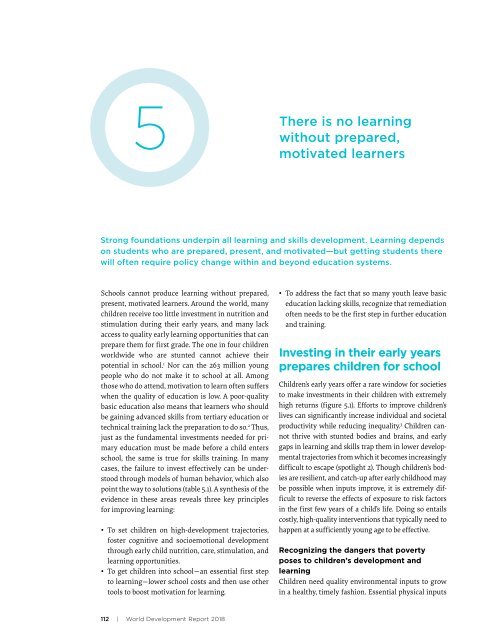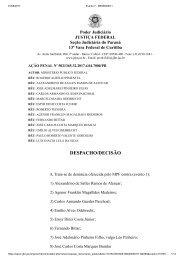Brasil só deve dominar Leitura em 260 anos, aponta estudo do Banco Mundial Relatorio Banco Mundial _Learning
You also want an ePaper? Increase the reach of your titles
YUMPU automatically turns print PDFs into web optimized ePapers that Google loves.
5<br />
There is no learning<br />
without prepared,<br />
motivated learners<br />
Strong foundations underpin all learning and skills <strong>deve</strong>lopment. <strong>Learning</strong> depends<br />
on students who are prepared, present, and motivated—but getting students there<br />
will often require policy change within and beyond education syst<strong>em</strong>s.<br />
Schools cannot produce learning without prepared,<br />
present, motivated learners. Around the world, many<br />
children receive too little investment in nutrition and<br />
stimulation during their early years, and many lack<br />
access to quality early learning opportunities that can<br />
prepare th<strong>em</strong> for first grade. The one in four children<br />
worldwide who are stunted cannot achieve their<br />
potential in school. 1 Nor can the 263 million young<br />
people who <strong>do</strong> not make it to school at all. Among<br />
those who <strong>do</strong> attend, motivation to learn often suffers<br />
when the quality of education is low. A poor-quality<br />
basic education also means that learners who should<br />
be gaining advanced skills from tertiary education or<br />
technical training lack the preparation to <strong>do</strong> so. 2 Thus,<br />
just as the fundamental investments needed for primary<br />
education must be made before a child enters<br />
school, the same is true for skills training. In many<br />
cases, the failure to invest effectively can be understood<br />
through models of human behavior, which also<br />
point the way to solutions (table 5.1). A synthesis of the<br />
evidence in these areas reveals three key principles<br />
for improving learning:<br />
• To set children on high-<strong>deve</strong>lopment trajectories,<br />
foster cognitive and socio<strong>em</strong>otional <strong>deve</strong>lopment<br />
through early child nutrition, care, stimulation, and<br />
learning opportunities.<br />
• To get children into school—an essential first step<br />
to learning—lower school costs and then use other<br />
tools to boost motivation for learning.<br />
• To address the fact that so many youth leave basic<br />
education lacking skills, recognize that r<strong>em</strong>ediation<br />
often needs to be the first step in further education<br />
and training.<br />
Investing in their early years<br />
prepares children for school<br />
Children’s early years offer a rare win<strong>do</strong>w for societies<br />
to make investments in their children with extr<strong>em</strong>ely<br />
high returns (figure 5.1). Efforts to improve children’s<br />
lives can significantly increase individual and societal<br />
productivity while reducing inequality. 3 Children cannot<br />
thrive with stunted bodies and brains, and early<br />
gaps in learning and skills trap th<strong>em</strong> in lower <strong>deve</strong>lopmental<br />
trajectories from which it becomes increasingly<br />
difficult to escape (spotlight 2). Though children’s bodies<br />
are resilient, and catch-up after early childhood may<br />
be possible when inputs improve, it is extr<strong>em</strong>ely difficult<br />
to reverse the effects of exposure to risk factors<br />
in the first few years of a child’s life. Doing so entails<br />
costly, high-quality interventions that typically need to<br />
happen at a sufficiently young age to be effective.<br />
Recognizing the dangers that poverty<br />
poses to children’s <strong>deve</strong>lopment and<br />
learning<br />
Children need quality environmental inputs to grow<br />
in a healthy, timely fashion. Essential physical inputs<br />
112 | World Development Report 2018








